From celebration to call to action: PCW partners with UN Women and SM Supermalls for an empowering and inspiring International Women’s Day in the Philippines
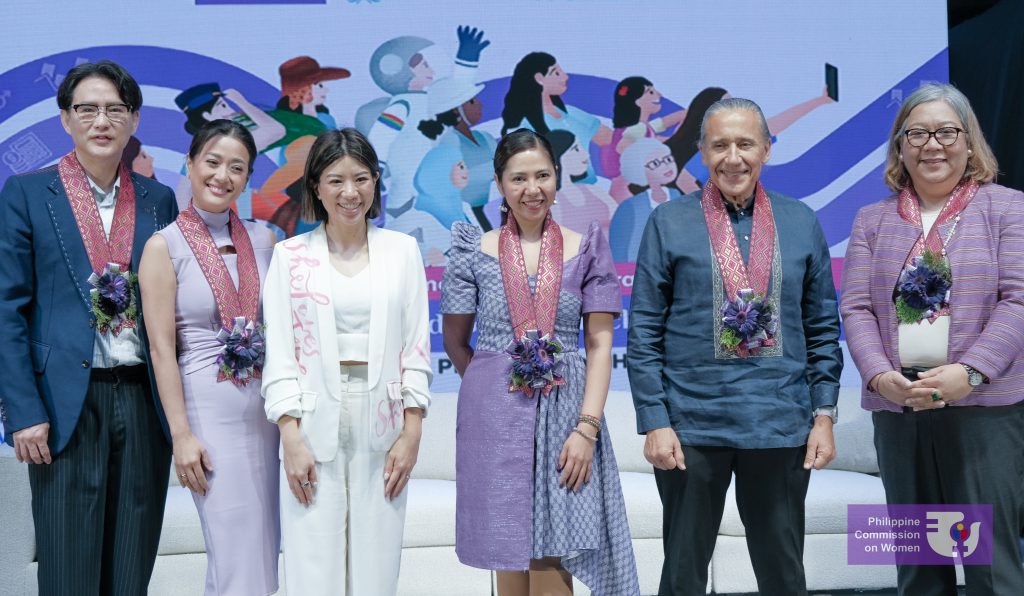
HAPPY WOMEN’S DAY, WOMEN AND EVERYONE!
The Philippine Commission on Women, in partnership with UN Women and SM Supermalls, led the 2024 celebration of International Women’s Day in the Philippines. In this photo, we have Mr. Steven Tan (President of SM Supermalls), Ms. Bernadette Sembrano-Aguinaldo (reporter, news presenter, and one of the event’s hosts), Ms. Leanne Robers (Co-founder of She Loves Tech and one of the event’s resource speakers), Atty. Khay Ann C. Magundayao-Borlado (PCW Officer-in-Charge), Mr. Gustavo González (United Nations Resident Coordinator in the Philippines), and Ms. Ma. Rosalyn Mesina (UN Women Philippines Country Programme Coordinator).
It was a day of empowerment and inspiration for Women and Everyone (WE) in the Philippines as the national entity for gender equality and women empowerment, the Philippine Commission on Women (PCW), in collaboration with UN Women and venue partner SM Supermalls, organized the International Women’s Day (IWD) Celebration on March 8, 2024 at SM Aura Premier, Taguig City.
The momentous event titled, “Investing in Equality toward a Gender-inclusive Prosperity,” anchored in the IWD theme, “Invest in Women: Accelerate Progress”, featured powerful panel dialogues on addressing poverty, strengthening institutions, and financing with a gender perspective. Resource speakers from the diplomatic corps, United Nations agencies, Philippine national government, financial institutions, and global and local women entrepreneurs led these discussions.
“Investing in women, as the phrase suggests, is about actually putting money where your mouth is, putting your emotions right, and actually providing the effort that is required. It’s not about just talking about the issue. It’s actually about your heart and your mind as well. And I think we made a huge progress. It just means we need to do more,” Australian Ambassador to the Philippines, Her Excellency HK Yu explained.
Ambassador of Canada to the Philippines, His Excellency David Hartman echoed what Ambassador Yu said. He added that investing in women is all about upholding values and principles, doing the right thing, and walking the talk like leveraging 100% of your human capital rather than the best 50% alone.
“If we have a chariot that’s two-wheel, and if that chariot wants to move, the two wheels need to move. If we look at men and women, we see one wheel is moving fast and the other wheel doesn’t move, the whole chair doesn’t move. In terms of economic development, in terms of political achievement, in terms of peacebuilding. That’s where I see the whole effort should be in. That, for me, is equality,” United Nations Development Programme (UNDP) Philippines Resident Representative, Dr. Selva Ramachandran stated.
For his statement, International Labour Organization (ILO) Country Director Khalid Hassan said that investing in women is imperative as the world of work is changing due to technological, environmental, and demographic changes. Coming from a standard setting organization, Director Hassan saw the need to prepare for the future of work so that women can have decent work despite inevitable changes.
“Just to turn around a little bit differently, it’s looking at the opportunity of cost of not investing in women. And I think that, you know, investing in women is crucial because you’re only gonna get development impact if you do that well. And it also means understanding what the different needs of different groups of women are in order to invest in the way that has the most bang for the buck,” Samantha Hung, Director of Gender Equality from the Climate Change and Sustainable Development Department of the Asian Development Bank, reminded.
Magundayao-Borlado emphasized the importance of a gender-responsive budgeting and its effective implementation and utilization to truly invest in women and achieve equality.
“Women, as we all know, constitute half of the world’s population or half of the world’s potential. We understand the crucial role women play in building our nation, as enshrined in RA 7192 or the Women in Development and Nation Building Act. However, advocating for gender equality requires more than just good intentions – it demands concrete action,” she said.
Atty. Borlado thus called upon their stakeholders to not just advocate for but to invest in women and double down on gender equality. She agreed with UN Women’s statement that ensuring the rights of women and girls across all aspects of life is the only way of securing prosperous and just economies as well as a healthy planet for future generations.
WE must invest in women wisely: PCW advocates for effective utilization of GAD budget
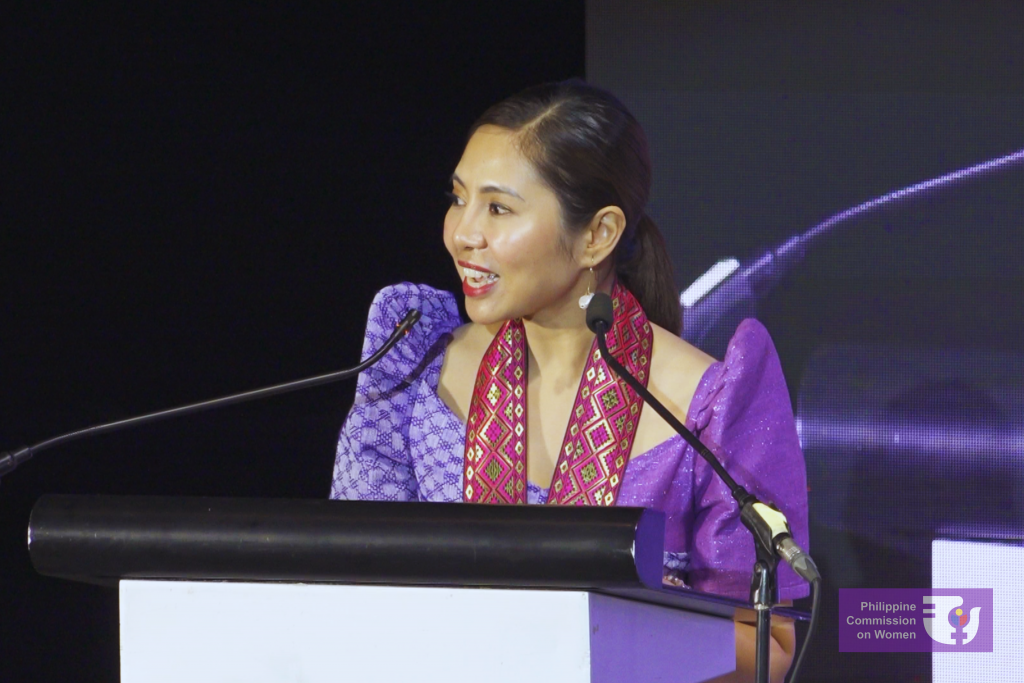
WOMEN’S MONTH IS A CALL FOR TRANSFORMATION
PCW Officer-in-Charge Atty. Khay Ann C. Magundayao-Borlado said in her special message that this year’s National Women’s Month is not just a celebration, it calls for a transformation. She added that 2024 is an important year for the Philippine Commission on Women “as WE celebrate milestones not only for women and girls but also for all Filipinos regardless of gender.”
Introduced in 1995 through the General Appropriations Act (GAA), the Gender and Development (GAD) budget mandates all government departments to allocate a minimum of 5% of their annual budget towards programs, projects, and activities specifically focused on gender equality.
The Magna Carta of Women (RA 9710) further solidified this commitment by mandating all government agencies to adopt gender mainstreaming as a core strategy.
“A GAD Plan and Budget or what we call GPB is like a game plan. Imagine having a specific strategy for each crucial gender issue and ensuring that you have allocation to support every move. GPB is a way for government agencies to take a systematic approach to gender mainstreaming, gender equality, and women empowerment,” Atty. Borlado explained.
The PCW, being the oversight body monitoring the use of the GAD budget, including the submission of annual GPBs and GAD Accomplishment Reports, urged their stakeholders to utilize the GAD budget effectively.
“Ang GAD budget ay hindi basta pondo, ito ay mekanismo para sa pagbabago. Gender-responsive budgeting is about looking closely at everyone’s needs, no matter the gender, and ensuring that these needs are met. When we judiciously utilize the GAD budget, we provide women the tools they need to empower themselves,” Atty. Borlado added.
In addition, the GAD budget calls for accountability because the government is held responsible for progress by tracking how money is spent on women’s programs. It’s also part and parcel of the Sustainable Development Goals (SDGs) because gender-responsive budgets help member states achieve global goals such as gender equality, poverty reduction, and quality education for all.
“To invest in women, we need a GAD budget that works. That is why we are excited for this event as we are tackling this vital part of the push for gender equality,” Atty. Borlado reiterated.
WE must start local: Diplomatic corps cite importance of grassroots work
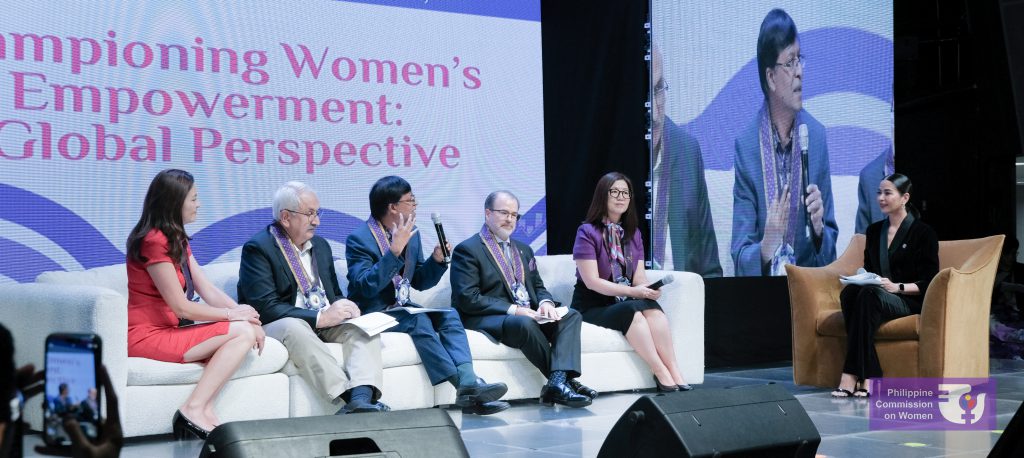
CHEERS TO FILIPINO WOMEN LEADERS!
Australian Ambassador to the Philippines, Her Excellency HK Yu (one of the panelists during the dialogue on “Championing Women Empowerment: A Global Perspective”) commended the Philippines for having women in leadership positions compared to other countries. “You have had more women presidents than Australia has a woman prime minister. That makes me feel a little bit embarrassed, but these are the facts. And I look at even the business community, many women CEOs, women leaders that often don’t actually feel that there are barriers,” she said.
During the first panel discussion on “Championing Women Empowerment: A Global Perspective,” Ambassador Yu declared that Australia, being a staunch supporter of gender equality, has maintained a development program in the Philippines that goes back 50 years.
“Our development program for the Philippines is Australia’s 5th largest. And recently, through our international development policy that was launched by the Australian government, we had recommitted to spending at least 80% of our development programs to address gender equality issues. And that applies to the Philippines as well,” she revealed.
Australia’s development program for the Philippines in 2023-2024 equates to nearly 90 million Australian dollars. To take 80% of that means 72 million dollars will be placed on programs that champion gender equality and the rights of Filipino women and girls. Ambassador Yu added that all the work they do with the Philippines is always locally driven.
“We believe in grassroots work because that’s the only way we are going to be able to bring about change that lasts, that’s sustainable. And some of the results are amazing, astounding,” she proudly said.
Ambassador Hartman ech oed the need to start local when it comes to pushing for gender equality and women empowerment before going global.
“We want to support the mandates and advocacies of the local government units (LGUs) and even going into the barangays to help them adopt a feminist perspective in their engagement with their stakeholders,” he said.
United Nations Resident Coordinator in the Philippines Mr. Gustavo González agreed that change must be implemented at the local, regional, or national level so that it will be sustainable.
“Sometimes dealing with gender issues, we have normative frameworks, universal values. But the challenge is when we try to, and allow me to express this word, we need to country-size. It means we need to make those values and principles that are adaptive to the circumstances of the country particularly in terms of implementation,” he explained.
Canada has also been a longstanding partner of empowering women and gender equality. According to Ambassador Hartman, their country has been working with the Philippine government since 1991, including partnering with the PCW through the Gender-Responsive Economic Actions for the Transformation of Women (GREAT Women) Project. Until today, the two countries continue working in partnership on various initiatives.
“We currently have about 50 million Canadian dollars or 2 billion Philippine pesos dedicated specifically to supporting projects in the Philippines where gender objectives are among the principles, if not the main objective, of the project,” he added.
Ambassador Hartman said that over the past years, the Canadian government has been focused on advancing the Women, Peace and Security (WPS) agenda in the Bangsamoro Autonomous Region in Muslim Mindanao (BARMM).
Mr. González specifically mentioned that the Comprehensive Agreement on the Bangsamoro (CAB), which will commemorate its 10th anniversary on March 27, 2024, is worth replicating. It is the final peace accord between the Philippine government and the Moro Islamic Liberation Front (MILF) that ended decades of armed conflict and resulted in long-lasting peace in the region.
“It’s one of the few examples where we had women around the table. Women that contributed to the preparation, the formulation, and we see the implementation of the Bangsamoro, the CAB, a very good example. Now it has become a sort of good practice,” he shared.
WE must know the numbers: UN RC sees gender equality as unfinished business
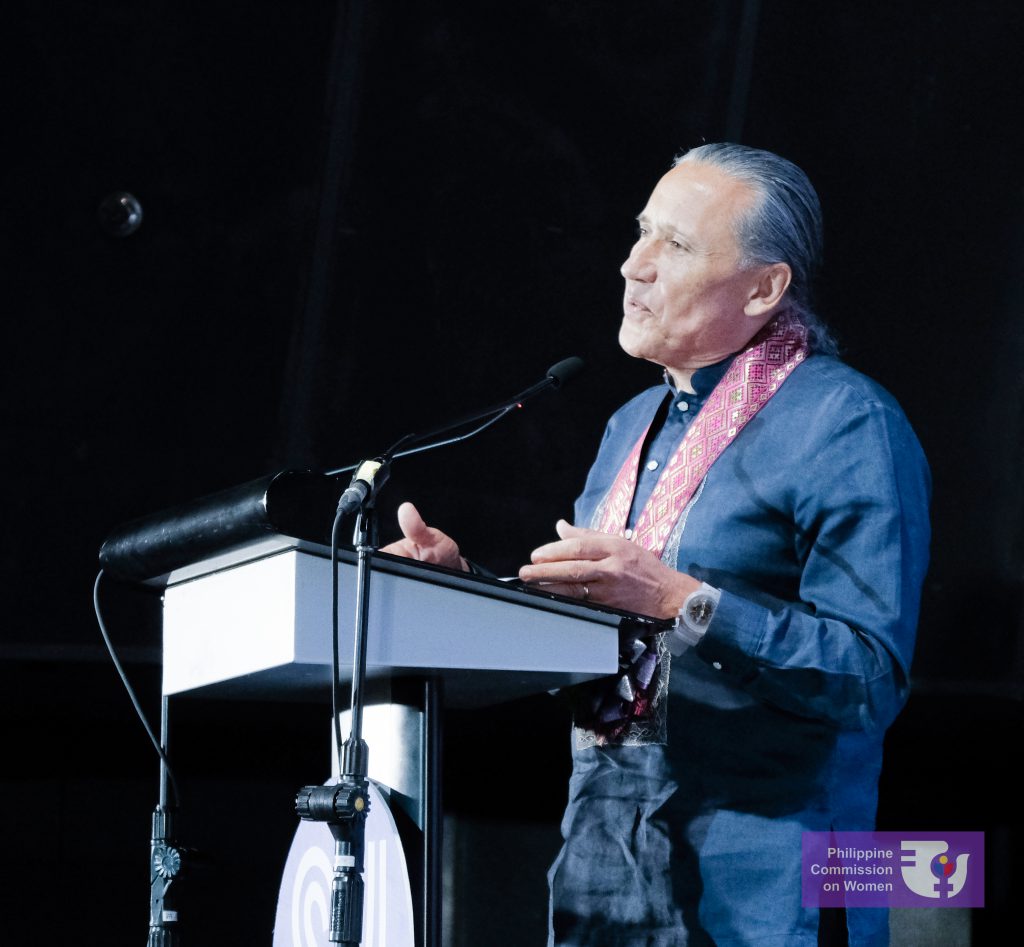
LIPUNANG PATAS SA BAGONG PILIPINAS: KAKAYAHAN NG KABABAIHAN, PATUTUNAYAN!
In his special message, UN Resident Coordinator in the Philippines, Mr. Gustavo González commended the leadership of President Ferdinand Marcos Jr. for personally witnessing the signing of the 2024-2028 UN Sustainable Development Cooperation Framework (UNSDCF) last October. “I think it’s the only country in the world where we have a President of the Republic at the signing of the UN Development Cooperation Framework.” Mr. Gonzalez added, “We agreed with the government to include outcome indicators to monitor how new investment will contribute to better outcomes for women and girls such as improving maternal mortality, reducing violence against women and girls, women’s economic empowerment, and measuring female labor force participation.”
While there is so much to celebrate in the progress that the Philippines has made in championing gender equality and women empowerment, Mr. Gonzalez emphasized the importance of addressing the remaining challenges by knowing the real statistics.
“We celebrate, but we also recognize the enormous obstacles that women face from structural discrimination, marginalization, violence, to cascading crises that affect them. First and worst, to the denial of their personal autonomy and rights over their bodies and lives. So, we live in a world where women enjoy less than 2/3 of their legal rights available to men,” he declared.
Keeping in mind that gender equality is still an unfinished business, Mr. Gonzalez emphasized that the IWD Celebration must serve as a strong call to action. He added that gender equality is both a question of power and a political issue because we still live in a male-dominated world with a male-dominated culture.
“There is a question of power. There is a political issue that I think is important for all of us to take into account. So, for the gates, the parameters to, for the reduction of poverty were developed from the male perspectives. Even the protocols on humanitarian assistance were female blinded. Even peace agreements, they were conceived, they were negotiated, they were implemented as a men-centered process,” he said.
Mr. Gonzalez also cited the so-called default man thinking where there is an unquestioned assumption that men are the standard, which has led to the biggest data gap in the world because very often women are not counted.
“Just look at the way the problems that we have in reporting on the SDGs. And this is not just the UN, it’s the Philippine Statistics Authority, an institution of the government. I’m sure that is the problem of the Philippine Commission on Women. Data gathering is a serious problem, and we cannot say that it is not just by the fact of not having the right tools,” he stated.
Still, women worldwide earn just 77 cents for every dollar earned by men. The latest research by the World Economic Forum says it will take until 2255 to close the gender pay gap, which is one of the reasons why 70% of the world’s poor are women and girls. Moreover, women and girls do some 12 billion hours of unpaid care work around the world every day, which is 3 times more than men. And in some communities, women can spend 14 hours a day cooking, cleaning, fetching food and water, and caring for children and the elderly.
“But gross domestic product (GDP) puts zero value on anything that happens at home. So every time we try to argue that GDP is the most comprehensive way of assessing performance, we need to take into account that there are so many billions of dollars, if we monetize the work of women, that they are not counted in this very restrictive metric that sometimes is used for very important economic decisions. And of course, it is contributing to distortions of gender sensitive policies and deny women opportunities,” he explained.
The implication of such discrimination, according to Mr. Gonzalez, are everywhere. Women are at high risk of being injured in a car accident because seats and safety belts are predominantly designed for men. Similarly, women have a higher fatality rate from heart attacks due to diagnostic tools designed based on male characteristics. Furthermore, with women occupying just 26% of the jobs in artificial intelligence, it is not surprising that many of the algorithms are biased towards men.
“So, transforming such balance of power is an imperative not only as a question of human rights, personal development, health and wellbeing. Every time we show our gender balance composition at the government level, in business corporations, in LGUs, academe, cultural and sports association, in international organizations like the UN, we are not just fixing a long overdue political imbalance; but, we are building more inclusive, just, and sustainable societies,” he declared.
Mr. Gonzalez also presented statistics on labor force participation in the Philippines as of December 2023 where female participation rate stood at 56% in comparison to the male labor force participation, which was 77%. Meanwhile, in the 2022 Gender and Equality Index produced by UNDP, the specific dimension of empowerment, as measured by the share of seats in the parliament, showed women in the Philippines only held 28% compared with men who held 72%.
Nonetheless, the Philippines’ score (78.8%) in the recent World Bank Report on Women, Business, and Law is above global average and above regional average. The country also ranked 16th among 146 countries in the 2023 World Economic Forum Report on the Global Gender Gap Index and placed second to New Zealand in the East Asia and Pacific Region.
Hence, Mr. Gonzalez commended the leadership of PCW and UN Women for these positive trends and encouraged the GAD Focal Point System (GFPS) in the Philippine government who are doing the work at the field level.
The GFPS is an interacting and interdependent group of people tasked to catalyze and accelerate gender mainstreaming. It is also an enabling mechanism established to ensure and advocate for, guide, coordinate and monitor the development, implementation, monitoring, review, and update of their GAD plans and GAD-related programs, activities, and projects.
WE must act now: UN Women encourages GAD focal point system to take concrete action
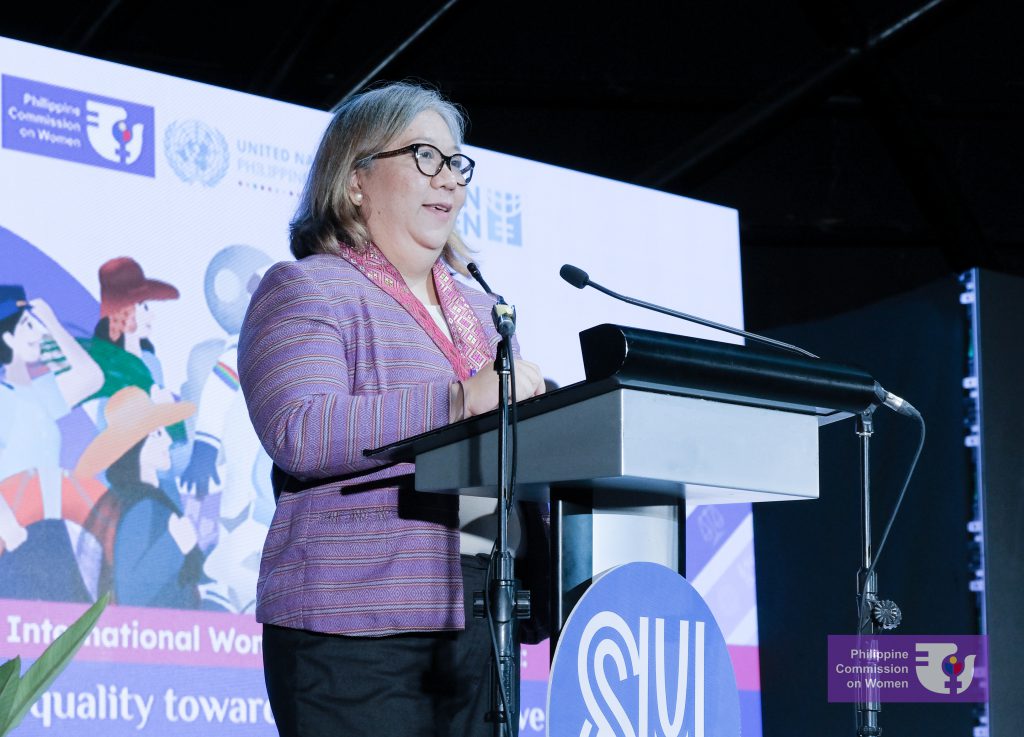
WOMEN’S DAY IS ALSO A CALL FOR COLLABORATION
Few days before the start of the 68th annual Commission on the Status of Women where the Philippines will be the Chair, UN Women Philippines Country Programme Coordinator, Ma. Rosalyn Mesina reminded Women and Everyone that the work is not yet done and WE all need to work together. “As we aim to showcase our work and commitment at the global stage when our delegation and head of delegation delivers our statement and share what we are doing here in the Philippines, may we all here at home be proud at what we have accomplished but also be challenged and ready to take on, contribute, and hopefully, also enjoy and benefit from an inclusive, progressive, and sustainable community and country,” she said.
UN Women Philippines Country Programme Coordinator, Ma. Rosalyn Mesina shared that the Philippines will be chairing the UN Commission on the Status of Women 68th Session (UN CSW68), recognized as the UN’s largest annual gathering on gender equality and women empowerment.
As the Chair, Ms. Mesina revealed that the Philippine delegation has the opportunity to rally and get together various member states to commit and deliver for women and girls to deliberate actions that should address poverty, strengthening institutions, and financing with a gender perspective.
“And today, prior to that global meeting, we want to be able to engage and have the discussions here in this hall. And you all would hope to be the ones to carry that forward and make those actions happen in your own offices as you deliver your mandates,” Ms. Mesina said in reference to the GFPS representatives present at the IWD Celebration.
She added that the event is an opportunity for all GFPS to better understand and appreciate the key role that investments and resources play in transforming the lives of women and girls.
“From GAD budgets to development aid, from public and private investments, it has the potential to accelerate change: the situation of a community vulnerable from climate change or disasters to becoming a sustainable, resilient, and thriving one; that of a family wanting to ensure better living conditions in a safe and peaceful environment; or of a woman or a girl struggling to find pathways to earn a decent living, to finish school, or even survive a day without fear of harm or harassment,” Ms. Mesina explained.
She also expressed optimism that the GFPS representatives will be more encouraged and driven to ensure that those budgets really work for the intention where they are hoped to be delivered.
Ms. Mesina further stressed the importance for all of them to be able to sit down, not just with their peers who are fellow GAD champions or focal persons, but with other units in their offices to discuss, ask, challenge, think through, and reflect on the resources available and how these resources can make a difference for women employees in their offices and agencies and have many high returns if done right.
Atty. Borlado had high hopes too that the GFPS and other duty bearers will be working hand in hand with the PCW in their advocacy to build a gender-equal Philippines.
“The Philippine Commission on Women encourages all of you to work double for this advocacy, invest in women, and accelerate progress for a Lipunang Patas sa Bagong Pilipinas where no one, regardless of gender, is left behind and where gender equality is a lived reality,” she concluded.
WE must continue working together: Senator Legarda calls for stronger collaboration among government, NGOs, and POs on women empowerment
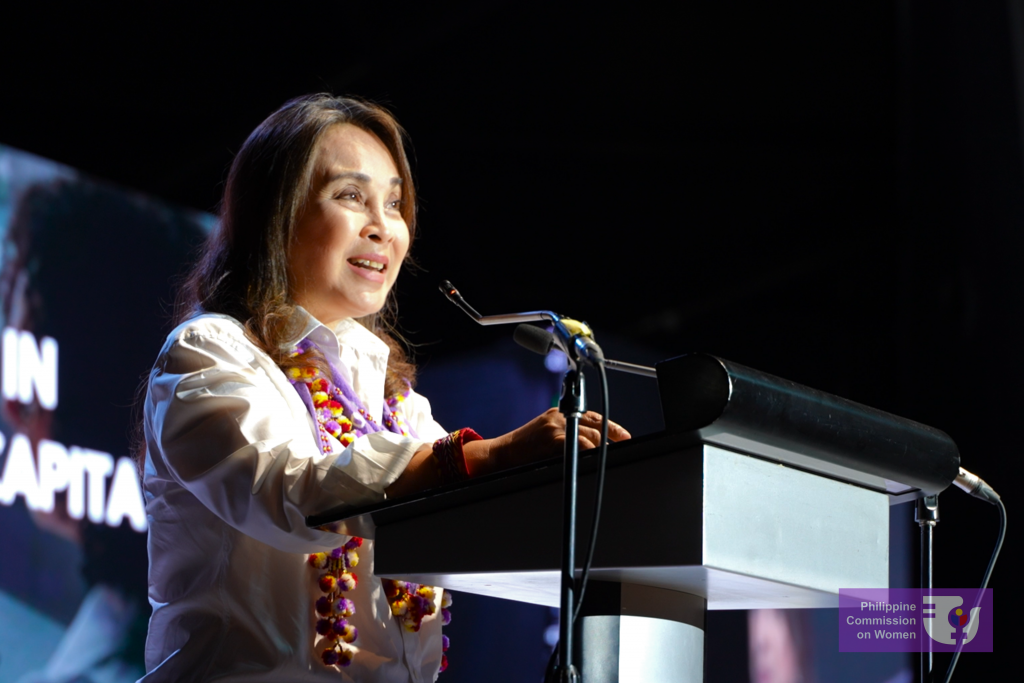
WOMEN-RELATED LAWS MUST NOT JUST BE INK ON PAPER
Senator Loren Legarda, the keynote speaker at the IWD Celebration, emphasized the importance of funding and implementing laws and policies on women. “These will be all just ink on paper if we do not fund these laws if it’s not efficiently and effectively implemented.” Senator Legarda is a public servant of more than two decades, a steadfast advocate for the welfare of women, youth, and children, and is currently serving as the Senate President Pro Tempore.
In her keynote speech, Senator Loren Legarda congratulated the PCW, UN Women, and SM Supermalls for spearheading this year’s IWD Celebration and reminded them to not just highlight how far they have come and chart a course for the future, but to pose new questions and fresh challenges because each passing year brings a new context to the Philippines’ struggle for equity.
“We have, indeed, come a long way. But we cannot keep counting our laurels year after year and not challenge the very foundations of the women’s movement and the consequent failure to take our own talents and gifts into account. These differences, talents, and gifts might conceivably not make us equal but better adapted at facing the multiple crises that our planet is facing,” she said.
As the country moves towards achieving the SDGs, Senator Legarda encouraged Women and Everyone to reconsider the phrase women empowerment as connoting that the power has to be taken from somewhere else, that there is an inherent weakness in the gender, and that there is a need to take power from a stronger gender. Instead, she said that power must be taken from our own assets and generated from within.
“To do so in practical terms, we need to ensure that our gains progress into real benefits for women on the ground while considering their own resources and capacities. Just like power, resources cannot be mere dole-outs as this could potentially suppress women’s ability to use their local resources such as those obtained from foraging and other ecosystem services,” she explained.
Nevertheless, Senator Legarda highlighted that there are hundreds of millions of pesos allocated under livelihood assistance programs such as the Department of Labor and Employment or DOLE Integrated Livelihood Program (DILP-Kabuhayan), Department of Trade and Industry or DTI Shared Service Facilities (SSF) Program, and Department of Social Welfare and Development or DSWD’s Sustainable Livelihood Program (SLP) and Assistance to Individuals in Crisis Situations (AICS) Program that women-owned/run micro, small and medium enterprises (MSMEs) can access and avail.
“These programs, as I mentioned, align with the objectives of the laws I authored way back in my second term. That’s the Magna Carta for MSMEs and the Barangay Livelihood and Skills Training Act of 2008 (RA 9509). This Barangay Livelihood and Skills Training Act is actually implemented by the Technical Education and Skills Development Authority (TESDA). Again, for all TESDA accredited institutions, this Act includes programs that are allocated for the 4th, 5th, and 6th class municipalities. As long as they are accredited by TESDA, women and men can access this to become scholars. They support rural livelihood development mostly run by women,” she reported.
Senator Legarda reiterated that there’s so much to do and the way to do it is not just talk. She added that it is time for us to provide more opportunities for women in education, the workplace, entrepreneurship, rural development, governance, and leadership roles because the goal is to empower more women to achieve financial independence despite persistent challenges that hinder their access to equal opportunities in employment and financial stability.
“It’s not just having ink on paper or being on social media, which are very essential. But for me, the essential part of helping people is to ensure that they are given the wherewithal, the equipment, the financial assistance, and to see and measure the impact it has on the communities and their lives,” she underscored.
In closing, Senator Legarda thanked women’s organizations who cooperated with the government and recognized the importance of complying with the tedious requirements for accessing government funds through livelihood assistance programs. She also called upon all government agencies, non-governmental organizations (NGOs), and people’s organizations (POs) to continue working together for the empowerment of women, particularly women entrepreneurs who are community-based and grassroots-based.
“Let us continue to work together to break barriers and biases, challenge norms, and create a society where every person, regardless of gender, has the opportunity to thrive and realize their full potential. By investing in equality, we are investing in a future of gender-inclusive prosperity for all,” she said.
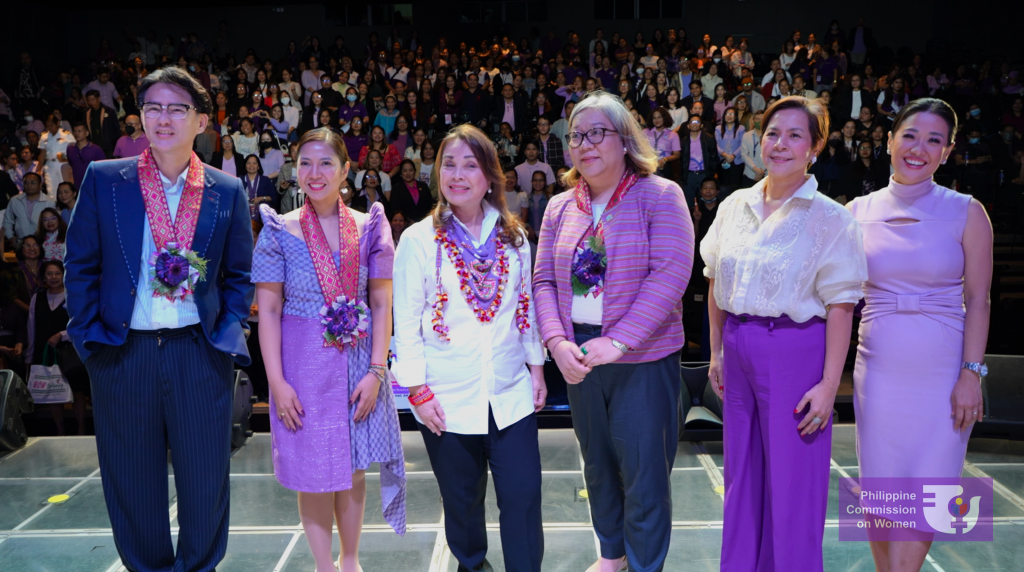
WOMEN AND EVERYONE MUST BE EQUAL
The panel discussions at the Philippines’ IWD Celebration revolved around the following: (1) Championing Women Empowerment: A Global Perspective, (2) Empowering Communities through Gender-Responsive Budgeting, (3) Bridging the Gap: Technology and Women Empowerment in Business, and (4) A Double-Edged Sword – Navigating the Benefits and Challenges of Technology. Ms. Jeanne Frances I. Illo, Gender Specialist from the UPPAF Regulatory Reform Support Program for National Development as well as UN Women Champions Ms. Rissa Mananquil-Trillo and Ms. Bianca Gonzalez moderated the panels. President Ferdinand Marcos Jr. expressed his support for the National Women’s Month Celebration (NWMC) through a video message. The recurring theme for the NWMC is “WE for a Gender Equality and Inclusive Society” and the sub-theme for 2024 is “Lipunang Patas sa Bagong Pilipinas: Kakayahan ng Kababaihan, Patutunayan!” In this photo, we have Mr. Steven Tan (President of SM Supermalls), Atty. Khay Ann C. Magundayao-Borlado (PCW Officer-in-Charge), Senator Loren Legarda (IWD Celebration keynote speaker), Ms. Ma. Rosalyn Mesina (UN Women Philippines Country Programme Coordinator), Ms. Maria Kristine Josefina G. Balmes (PCW Deputy Executive Director for Operations), and Ms. Bernadette Sembrano-Aguinaldo (reporter, news presenter, and one of the event’s hosts).

